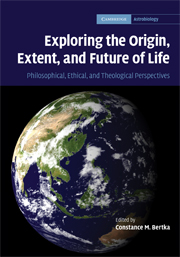 Exploring the Origin, Extent, and Future of Life
Exploring the Origin, Extent, and Future of Life from Part II - Extent of life
Published online by Cambridge University Press: 29 December 2010
There is a Family Circle cartoon that shows the father of the family escorting his daughter home from school. The caption is a single question that the little girl asks of her father: “If we send astronauts to Mars, do they hafta drive past Heaven?” While this strikes us as funny, it illustrates the double world in which many of us live. Few educated adults would ask the question in such simplistic terms. Nevertheless, many people live in a bifurcated world in which they have accepted the results of science, and presume the reasonable world of scientific endeavor. However, when it comes to thinking about God, some people still have a somewhat childish, antiquated, or rudimentary worldview. In the scientific world everything is open to question and results are only as valid as the evidence that supports them. With regard to God, however, both believers and non-believers often assume that religious issues can only be settled by reverting to a kind of mythic fideism.
In the contemporary Christian world of North America, the notion that God might have created other worlds with novel emergent life forms can threaten this basic religious intuition. The Genesis accounts of creation presume that the Earth is central to God's purposes, most notably that of establishing a special relationship with mankind. The discovery of extraterrestrial life in any form would seem to contradict this core assumption of the Judeo-Christian tradition.
To save this book to your Kindle, first ensure [email protected] is added to your Approved Personal Document E-mail List under your Personal Document Settings on the Manage Your Content and Devices page of your Amazon account. Then enter the ‘name’ part of your Kindle email address below. Find out more about saving to your Kindle.
Note you can select to save to either the @free.kindle.com or @kindle.com variations. ‘@free.kindle.com’ emails are free but can only be saved to your device when it is connected to wi-fi. ‘@kindle.com’ emails can be delivered even when you are not connected to wi-fi, but note that service fees apply.
Find out more about the Kindle Personal Document Service.
To save content items to your account, please confirm that you agree to abide by our usage policies. If this is the first time you use this feature, you will be asked to authorise Cambridge Core to connect with your account. Find out more about saving content to Dropbox.
To save content items to your account, please confirm that you agree to abide by our usage policies. If this is the first time you use this feature, you will be asked to authorise Cambridge Core to connect with your account. Find out more about saving content to Google Drive.